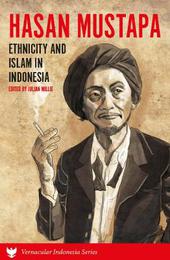
|
Hasan Mustapa: Ethnicity and Islam in Indonesia
Paperback / softback
Main Details
| Title |
Hasan Mustapa: Ethnicity and Islam in Indonesia
|
| Authors and Contributors |
Edited by Julian Millie
|
| Series | Vernacular Indonesia |
|---|
| Physical Properties |
| Format:Paperback / softback | | Pages:304 | | Dimensions(mm): Height 234,Width 153 |
|
| Category/Genre | Sufism and Islamic mysticism |
|---|
| ISBN/Barcode |
9781925495553
|
| Classifications | Dewey:297.09598 |
|---|
| Audience | |
|---|
|
Publishing Details |
| Publisher |
Monash University Publishing
|
| Imprint |
Monash University Publishing
|
| Publication Date |
1 October 2017 |
| Publication Country |
Australia
|
Description
Conversations about the role and value of Islamic diversity in Indonesias Islamic public sphere are becoming more frequent and intense. For some Muslims, homogeneity is a precondition for a prosperous and pious community. For others, diversity is a resource that is necessary for creating a just society, and for preserving Indonesias religious, political and social distinctiveness. Indonesias regional Islamic traditions are increasingly being cited as reference points in these conversations. Hasan Mustapa (18571930) was a scholar, mystic and poet who studied in Mecca for thirteen years before commencing his career as an Islamic official in the Netherlands East Indies. He wrote a number of sufistic treatises on Islamic belief and practice, mostly in the Sundanese language. To the surprise of many, his name and writings are now being more frequently referenced in public discourse. Indonesians are becoming more interested in his work, which they interpret as a characteristically Indonesian mediation of Islamic concepts belonging to the intellectual lineage of figures such as Ibn al-Arabi (d. 1240) and Abd al-Karim Al-Jili (d. 1424). Apart from that, members of the Sundanese ethnic group of West Java, who currently number around forty million, have shown renewed interest in his work as a model for nurturing a pro-diversity ethic in the provinces unsettled Islamic public sphere. Hasan Mustapa is comprised of chapters by Sundanese scholars, alongside the editors contributions. Some provide introductions to Mustapas life and work, while others perform a discursive move of increasing importance in contemporary Indonesia: reaching into a regional Islamic past to make authoritative statements about the present. Together, the chapters form a timely addition to the literature on a question of growing importance: what influence should regional traditions have in contemporary Islamic societies?
Author Biography
Hasan Mustapa: Ethnicity and Islam in Indonesia represents an important moment in Julian Millies ongoing project of exploring the meanings of Islamic ritual and tradition in contemporary Indonesia. His first book, Bidasari: Jewel of Malay Muslim Culture (KITLV 2004), was a study of Islamic romance in the Malay language. His second, Splashed by the Saint: Ritual Reading and Islamic Sanctity in West Java (KITLV 2009) was based on a period of field research over fourteen months during which he attended an Islamic intercession ritual in West Java. Since then, Millie has continued to work in West Java, focusing mainly on Islamic preaching and the interactions between sub-national and national Islamic spheres. He is currently an Associate Professor and Australian Research Council Future Fellow in the Anthropology program of Monash University.
ReviewsHasan Mustapa is a fascinating presentation of an extraordinary Indonesian scholar who was deeply engaged with Sufi thought during the height of the colonial era. Mustapa's firm grounding in local culture is balanced by a cosmopolitan spirituality, as revealed here for the first time in English. This richly documented study will be appreciated by anyone interested in modern Muslim thought. -- Carl W. Ernst William R. Kenan, Jr.
|